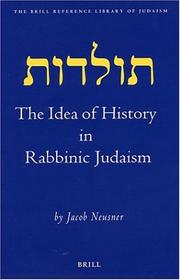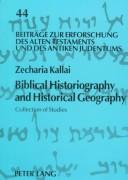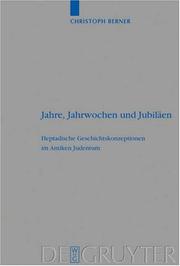| Listing 1 - 10 of 34 | << page >> |
Sort by
|
Book
ISSN: 07501919 ISBN: 9782204083263 2204083267 Year: 2007 Volume: 215 Publisher: Paris Cerf
Abstract | Keywords | Export | Availability | Bookmark
 Loading...
Loading...Choose an application
- Reference Manager
- EndNote
- RefWorks (Direct export to RefWorks)
Bible --- Historiography --- History of Biblical events --- 22 <063> --- 930.21 <33> --- Bijbel--Congressen --- Historiografie. Geschiedenis van de geschiedwetenschap--Oud-Palestina. Judea --- Conferences - Meetings --- 930.21 <33> Historiografie. Geschiedenis van de geschiedwetenschap--Oud-Palestina. Judea --- Historiography. --- History of Biblical events. --- Biblia
Book
ISBN: 1555405614 Year: 1991 Publisher: Atlanta Scholars Press
Abstract | Keywords | Export | Availability | Bookmark
 Loading...
Loading...Choose an application
- Reference Manager
- EndNote
- RefWorks (Direct export to RefWorks)
930.21 <33> --- Judaism --- -Jews --- -Hebrews --- Israelites --- Jewish people --- Jewry --- Judaic people --- Judaists --- Ethnology --- Religious adherents --- Semites --- Jews --- Religions --- Historiografie. Geschiedenis van de geschiedwetenschap--Oud-Palestina. Judea --- Historiography --- Religion --- -Historiografie. Geschiedenis van de geschiedwetenschap--Oud-Palestina. Judea --- 930.21 <33> Historiografie. Geschiedenis van de geschiedwetenschap--Oud-Palestina. Judea
Book
ISBN: 0866839909 Year: 1988 Publisher: New York (N.Y.): Harper and Row
Abstract | Keywords | Export | Availability | Bookmark
 Loading...
Loading...Choose an application
- Reference Manager
- EndNote
- RefWorks (Direct export to RefWorks)
History --- Biblical teaching. --- Bible. --- Historiography. --- 930.21 <33> --- -Annals --- Auxiliary sciences of history --- Historiografie. Geschiedenis van de geschiedwetenschap--Oud-Palestina. Judea --- Biblical teaching --- -Historiografie. Geschiedenis van de geschiedwetenschap--Oud-Palestina. Judea --- 930.21 <33> Historiografie. Geschiedenis van de geschiedwetenschap--Oud-Palestina. Judea --- Antico Testamento --- Hebrew Bible --- Hebrew Scriptures --- Kitve-ḳodesh --- Miḳra --- Old Testament --- Palaia Diathēkē --- Pentateuch, Prophets, and Hagiographa --- Sean-Tiomna --- Stary Testament --- Tanakh --- Tawrāt --- Torah, Neviʼim, Ketuvim --- Torah, Neviʼim u-Khetuvim --- Velho Testamento
Book
ISBN: 1555406459 Year: 1991 Volume: vol 32 Publisher: Atlanta Scholars Press
Abstract | Keywords | Export | Availability | Bookmark
 Loading...
Loading...Choose an application
- Reference Manager
- EndNote
- RefWorks (Direct export to RefWorks)
296 --- 930.21 <33> --- Judaism --- -Rabbinical literature --- -Hebrew literature --- Jewish literature --- Jews --- Religions --- Semites --- Judaïsme. Jodendom --- Historiografie. Geschiedenis van de geschiedwetenschap--Oud-Palestina. Judea --- Historiography --- History and criticism --- Religion --- -Judaïsme. Jodendom --- 930.21 <33> Historiografie. Geschiedenis van de geschiedwetenschap--Oud-Palestina. Judea --- -Jews --- Rabbinical literature --- Judaism - Historiography. --- Rabbinical literature - History and criticism.

ISBN: 1280465204 9786610465200 1423714539 9047402782 9781423714538 9789004135833 9004135839 9789047402787 9004135839 Year: 2003 Publisher: Leiden Brill
Abstract | Keywords | Export | Availability | Bookmark
 Loading...
Loading...Choose an application
- Reference Manager
- EndNote
- RefWorks (Direct export to RefWorks)
History provides one way of marking time. But there are others, and the Judaism of the dual Torah, set forth in the Rabbinic literature from the Mishnah through the Talmud of Babylonia, ca. 200-600 C.E., defines one such alternative. This book tells the story of how a historical way of thinking about past, present, and future, time and eternity, the here and now in relationship to the ages, « that is, Scripture's way of thinking » gave way to another mode of thought altogether. This other model Neusner calls a paradigm, because a pattern imposed meaning and order on things that happened. Paradigmatic modes of thought took the place of historical ones. Thinking through paradigms, with a conception of time that elides past and present and removes all barriers between them, in fact governs the reception of Scripture in Judaism until nearly our own time. Neusner here explains through the single case of Rabbinic Judaism, precisely how that other way of reading Scripture did its work, and why, for so many centuries, that reading of the heritage of ancient Israel governed. At stake are [1] a conception of time different from the historical one and [2] premises on how to take the measure of time that form a legitimate alternative to those that define the foundations of the historical way of measuring time. Fully exposed, those alternative premises may prove as logical and compelling as the historical ones. The approach follows the documentary history of ideas, and individual chapters describe the treatment of historical topics in the Mishnah, the Talmud of the Land of Israel (a.k.a., the Yerushalmi), Genesis Rabbah, that is, ca. 200, 400, and 450 CE, and Pesiqta deRab Kahana, ca. 500 CE.
Historiography in rabbinical literature. --- Rabbinical literature --- Judaism --- History --- Midrash --- Jews --- Religions --- Semites --- History and criticism. --- Philosophy. --- Religious aspects --- Judaism. --- Religion --- Historiography in rabbinical literature --- 930.21 <33> --- 930.21 <33> Historiografie. Geschiedenis van de geschiedwetenschap--Oud-Palestina. Judea --- Historiografie. Geschiedenis van de geschiedwetenschap--Oud-Palestina. Judea --- Annals --- Auxiliary sciences of history --- Religious aspects&delete& --- History&delete& --- Philosophy --- History and criticism
Book

ISBN: 9042908319 9072690125 Year: 2000 Volume: 3 Publisher: Leuven Peeters
Abstract | Keywords | Export | Availability | Bookmark
 Loading...
Loading...Choose an application
- Reference Manager
- EndNote
- RefWorks (Direct export to RefWorks)
Geschiedenis van de Oudheid --- Geschiedschrijving --- Histoire de l'Antiquité --- Historiographie --- 930.21 <33> --- #gsdb1 --- Historiografie. Geschiedenis van de geschiedwetenschap--Oud-Palestina. Judea --- Middle East --- Asia, South West --- Asia, Southwest --- Asia, Western --- East (Middle East) --- Eastern Mediterranean --- Fertile Crescent --- Levant --- Mediterranean Region, Eastern --- Mideast --- Near East --- Northern Tier (Middle East) --- South West Asia --- Southwest Asia --- Orient --- History --- -Historiography. --- 930.21 <33> Historiografie. Geschiedenis van de geschiedwetenschap--Oud-Palestina. Judea --- Asia, West --- West Asia --- Western Asia --- Historiography.

ISBN: 3631323956 0820435368 Year: 1998 Volume: Bd. 44 Publisher: Frankfurt am Main Lang
Abstract | Keywords | Export | Availability | Bookmark
 Loading...
Loading...Choose an application
- Reference Manager
- EndNote
- RefWorks (Direct export to RefWorks)
Bible. --- Historiography. --- Geography. --- Palestine --- Historical geography. --- Géographie historique --- 930.21 <33> --- 913.3 --- Historiografie. Geschiedenis van de geschiedwetenschap--Oud-Palestina. Judea --- Aardrijkskunde van Palestina --- 930.21 <33> Historiografie. Geschiedenis van de geschiedwetenschap--Oud-Palestina. Judea --- Géographie historique --- Antico Testamento --- Hebrew Bible --- Hebrew Scriptures --- Kitve-ḳodesh --- Miḳra --- Old Testament --- Palaia Diathēkē --- Pentateuch, Prophets, and Hagiographa --- Sean-Tiomna --- Stary Testament --- Tanakh --- Tawrāt --- Torah, Neviʼim, Ketuvim --- Torah, Neviʼim u-Khetuvim --- Velho Testamento

ISBN: 2130520642 9782130520641 Year: 2001 Volume: 3616 Publisher: Paris PUF
Abstract | Keywords | Export | Availability | Bookmark
 Loading...
Loading...Choose an application
- Reference Manager
- EndNote
- RefWorks (Direct export to RefWorks)
Jews --- Juifs --- Historiography --- Historiographie --- Historiography. --- 930.21 =924 --- 930.21 <33> --- -930.21=924 --- Hebrews --- Israelites --- Jewish people --- Jewry --- Judaic people --- Judaists --- Ethnology --- Religious adherents --- Semites --- Judaism --- Historiografie. Geschiedenis van de geschiedwetenschap--Hebreeuws --- Historiografie. Geschiedenis van de geschiedwetenschap--Oud-Palestina. Judea --- 930.21 <33> Historiografie. Geschiedenis van de geschiedwetenschap--Oud-Palestina. Judea --- 930.21 =924 Historiografie. Geschiedenis van de geschiedwetenschap--Hebreeuws --- 930.21=924 --- Jews - Historiography --- Histoire
Book
ISBN: 3825703282 9783825703288 Year: 2003 Volume: 145 Publisher: Berlin Philo
Abstract | Keywords | Export | Availability | Bookmark
 Loading...
Loading...Choose an application
- Reference Manager
- EndNote
- RefWorks (Direct export to RefWorks)
Genealogy in the Bible. --- 930.21 <33> --- Historiografie. Geschiedenis van de geschiedwetenschap--Oud-Palestina. Judea --- 930.21 <33> Historiografie. Geschiedenis van de geschiedwetenschap--Oud-Palestina. Judea --- Genealogy in the Bible --- Bible. --- Antico Testamento --- Hebrew Bible --- Hebrew Scriptures --- Kitve-ḳodesh --- Miḳra --- Old Testament --- Palaia Diathēkē --- Pentateuch, Prophets, and Hagiographa --- Sean-Tiomna --- Stary Testament --- Tanakh --- Tawrāt --- Torah, Neviʼim, Ketuvim --- Torah, Neviʼim u-Khetuvim --- Velho Testamento --- Historiography.

ISBN: 3110190540 9786612195129 1282195123 3110200767 9783110190540 9783110200768 Year: 2006 Volume: 363 Publisher: Berlin Walter de Gruyter
Abstract | Keywords | Export | Availability | Bookmark
 Loading...
Loading...Choose an application
- Reference Manager
- EndNote
- RefWorks (Direct export to RefWorks)
Die Arbeit bietet die erste Untersuchung aller heptadisch strukturierten Geschichtsentwürfe aus der Zeit des Zweiten Tempels. Behandelt werden Dan 9, das äthiopische Henochbuch, das Jubiläenbuch, die Qumrantexte und das Testament Levis. Durch detaillierte Einzelexegesen wird gezeigt, dass jeder Text ein individuelles geschichtstheologisches Profil aufweist. Im Hintergrund der zu verzeichnenden Gemeinsamkeiten steht keine universell gültige Referenzchronologie, sondern die Arbeit mit denselben chronologischen Traditionen, die je nach theologischem Interesse überformt werden. This study presents the first analysis of all the heptadically structured models of Jewish history from the time of the Second Temple. It deals with Daniel 9, the Ethiopian Book of Henoch, the Book of Jubilees, the Qumran texts and the Testament of Levi. Detailed individual exegesis shows that each text displays an individual theology of history. There is no universally valid reference chronology behind those commonalities which can be registered; instead, the writers work with the same chronological traditions, but restructure them according to their own theological interests.
930.21 <33> --- 930.21 <33> Historiografie. Geschiedenis van de geschiedwetenschap--Oud-Palestina. Judea --- Historiografie. Geschiedenis van de geschiedwetenschap--Oud-Palestina. Judea --- Judaism. --- Bible. --- Criticism, interpretation, etc. --- Jews --- Religion --- Antico Testamento --- Hebrew Bible --- Hebrew Scriptures --- Kitve-ḳodesh --- Miḳra --- Old Testament --- Palaia Diathēkē --- Pentateuch, Prophets, and Hagiographa --- Sean-Tiomna --- Stary Testament --- Tanakh --- Tawrāt --- Torah, Neviʼim, Ketuvim --- Torah, Neviʼim u-Khetuvim --- Velho Testamento --- Religions --- Semites --- Jewish Antiquity. --- historiography. --- theological history.
| Listing 1 - 10 of 34 | << page >> |
Sort by
|

 Search
Search Feedback
Feedback About UniCat
About UniCat  Help
Help News
News